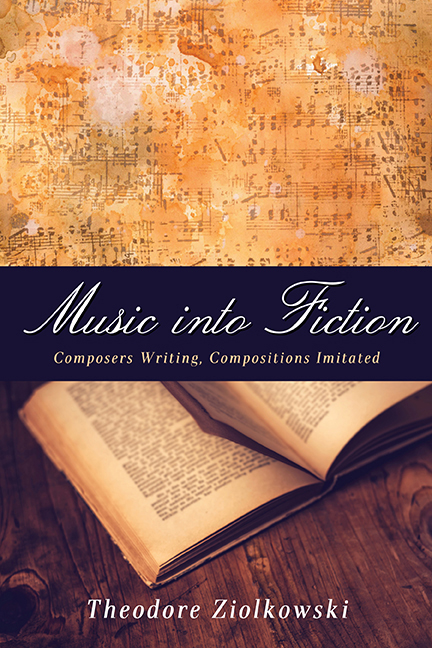Book contents
- Frontmatter
- Dedication
- Contents
- Preface
- Prelude: Introduction
- First Movement: Composers Writing
- 1 Weber and Hoffmann
- 2 Berlioz and Schumann
- 3 Wagner
- 4 Transition: Nietzsche and the Post-Wagnerians
- 5 Burgess
- Second Movement: Compositions Imitated
- Finale: Composers Setting Fictional Compositions
- Coda: Conclusion
- Bibliography
- Index
2 - Berlioz and Schumann
from First Movement: Composers Writing
Published online by Cambridge University Press: 09 May 2017
- Frontmatter
- Dedication
- Contents
- Preface
- Prelude: Introduction
- First Movement: Composers Writing
- 1 Weber and Hoffmann
- 2 Berlioz and Schumann
- 3 Wagner
- 4 Transition: Nietzsche and the Post-Wagnerians
- 5 Burgess
- Second Movement: Compositions Imitated
- Finale: Composers Setting Fictional Compositions
- Coda: Conclusion
- Bibliography
- Index
Summary
Hector Berlioz (1803–69) provides a fascinating transition from Weber to Wagner. Ten years older than Wagner, he became an ardent admirer of Weber's music at the age of twenty-one, when he first heard Der Freischütz, albeit in the garbled adaptation by Castel-Blaze as Robin des bois. “If great creative artists could only divine the grand passions their works inspire!” he gushed in his Memoirs (1870). “If only it were given to them to perceive the enthusiasm of a hundred thousand hearts concentrated in a single heart.” Berlioz's justly acclaimed orchestration—especially meaningful to him since his access to music was through the flute and guitar, not the piano—owed much to his careful study of Weber, who “handled every instrument with incomparable skill and restraint” (481). But in another direction altogether Berlioz also extended Weber: his Evenings with the Orchestra (Les soirées de l'orchestre, 1852) amounts to the kind of work that Weber had hoped to achieve with his fragmentary novel.
Evenings with the Orchestra
Berlioz's extraordinary abilities as a writer, familiar to many readers from his Memoirs, are even more brilliantly displayed in Evenings with the Orchestra, a unique literary potpourri comprising anecdotes, reviews, biographical sketches, fantasies, and short fiction, along with a good deal of contemporary musical gossip and autobiographical elements. It is a signal of his literary recognition that Berlioz—who like Weber and Hoffmann belonged to an artists’ coterie, the well-known Petit Cénacle—is the only composer included in the three volumes of Scribner's European Writers: The Romantic Century.
The comic framework of Evenings with the Orchestra describes the custom among members of the orchestra “in a certain opera house of northern Europe … to spend their time reading books—or even discussing matters literary and musical—whenever they perform any secondrate operas” (5). On several of the twenty-five evenings that the narrator spends with them—when such admired works as Der Freischütz are being performed (52), Fidelio (187), The Barber of Seville (200), Don Giovanni (221), Iphigenia in Tauris (253), and The Huguenots (257)—not a word is spoken and the musicians listen with virtually religious adoration to the music of Weber, Beethoven, Rossini, Mozart, Gluck, and Meyerbeer.
- Type
- Chapter
- Information
- Music into FictionComposers Writing, Compositions Imitated, pp. 30 - 57Publisher: Boydell & BrewerPrint publication year: 2017

